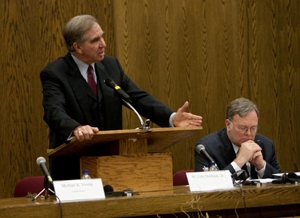Closing Remarks 2009: Michael K. Young and W. Cole Durham, Jr.

The Center was pleased to hear during the closing plenary session of the 16th Annual International Law and Religion Symposium in Provo on 6 October 2009 remarks by Michael K. Young, President of the University of Utah. President Young is a graduate of Harvard Law School and was clerk to Supreme Court Justice William Rehnquist. Before coming to the University of Utah, he was Dean of the George Washington Law School, Director of Columbia University’s Japanese Legal Studies Center, and U.S. Ambassador for Trade and Environmental Affairs. Among many other positions, he also served as the chairman of the U.S. Commission on International Religious Freedom, which experience served to inform his 2009 Symposium remarks.
Addressing the Symposium theme, President Young asked, “Can these various centers of dialogue—academy, governments, quasi-government organizations, NGOs, faith-based organizations—come together in a way that creates a true, agreed-upon international agreement that is effective?” From his long experience in the matter, President Young noted several requirements for such a result, including development, internally within the organizations and externally among them, of the capacity to be consistent in truly protecting principles of religious liberty for one’s own group and for all others, even when it might not be crystal clear that so doing is in one’s own interests. “The dialogue here [at the Symposium],” concluded President Young, “is an important beginning.” In response to a question from the audience, President Young noted “a small ray of light for a brighter future” in the fact that the level of violent conflict in the world has dramatically decreased during the past 30 years, dropping “almost 90%” over what it was in 1970. There are hopeful signs, he said, and “this conference is one of them.”
President Young had opened his remarks with a tribute to ICLRS Director Cole Durham: “I think there are few people in the world who have done more to enable us to think about religious liberties, to think about the relationship appropriate levels of government controls and faith-based organizations that Cole has. He brings a human perspective, but also a keep intellectual approach that have left me in awe at every conference I have attended.” In his own concluding remarks, Professor Durham noted that the challenges in promoting worldwide religious liberty “don’t seem to go away.” It is easier, he observed, to burn bridges than to build them. Reflecting upon observations by the delegate from Egypt, Dr. Tayseir Mandour, about the importance of reaching young people with correct principles, Professor Durham remarked: “We underestimate how little time we have with each rising generation to inculcate principles of respect and tolerance.” We must, he said, summarizing the remarks of keynote speaker Anastasia Crickley, “get beyond parallel lines.” In the words of keynote speaker Justice Pius Nkonzo Langa, we need to be sure that our home countries and home environments are places are worthy of the name home. “Justice Langa reminded us that you can’t be at home in the world at large unless you have a home of your own. We need to make those home environments safe for freedom of religion or belief.” As Bishop Juan Edghill, delegate from Guyana, observed: “Religious liberty thrives where there is a genuine movement from mere tolerance to respect. Religious liberty exists where you can freely propagate your faith without being demonized or vilified, and without demonizing and vilifying the faith of others.”
One of the things a conference like this can do, noted Professor Durham, is raise consciousness and help us see our own work. We must learn to expand the room at the dialogue table. If you truly listen to others, you can find solutions that no one working as a single body could find on their own. And beyond the dialogue is what Professor Tore Lindholm calls diapraxis—”the effort to find ways for groups not merely to talk together, but to work on joint projects together.” Professor Durham then made reference to Dr. John Taylor, who represents the International Association for Religious Freedom at the UN’s Geneva office and who had noted earlier in the day that “we can’t have rights without responsibilities” and that too many declarations and expressions of good will receive only lip service by governments and by society. Professor Durham referred delegates to the initiatives Professor Taylor referenced that are coming on international front, including an inter-religious coalition of some 60 organizations established to move for the initiation of a United Nations decade for interreligious and intercultural dialogue, understanding, and cooperation for peace. (See the coalition website here.)
“The fundamental questions we are really asking today,” summarized Professor Durham, “boil down to questions about how patterns of neighborliness can be encouraged, so that when the fire of intolerance begins to rage, people come out and say, ‘Put the fire away. These people are our friends.'”